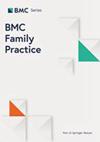Centering the role of community health workers in social risk screening, referral, and follow-up within the primary care setting
IF 3.2
3区 医学
Q1 MEDICINE, GENERAL & INTERNAL
引用次数: 0
Abstract
Community health workers (CHWs) remain an underutilized resource in social risk diagnostics in the primary care setting. This process evaluation study seeks to assess the role of CHWs in social risk screening, referral, and follow-up through process mapping to identify barriers to the process for future quality improvement efforts. Researchers at the Arizona Prevention Research Center (AzPRC) engaged with two Federally Qualified Health Centers (FQHCs) in two of Arizona’s major urban areas to evaluate their internal processes for social risk screening and intervention. The Consolidated Framework for Implementation Research (CFIR) was used to direct a process mapping exercise to visually describe the workflow, gaps, and barriers to identifying and addressing social risk. The process unveiled key areas for health system improvements in the community setting, the organizational setting, and in the implementation of social risk screening, referral, and follow-up. Further, process maps highlight the potential resources needed for effective CHW integration to address social risk in the primary care setting. Our findings demonstrate the importance of organizational tools, such as process mapping, to assist primary care settings in evaluating internal processes for quality improvement in addressing social risk and in effectively integrating the CHW workforce. Subsequent research will evaluate rates of social risk screening, referral, and follow-up within all of Arizona’s FQHCs and propose models for CHW integration to address social risk in primary care and strengthen social risk screening reach and effectiveness.将社区卫生工作者在初级保健环境中的社会风险筛查、转诊和随访作用置于中心位置
在初级医疗机构的社会风险诊断中,社区保健员(CHWs)仍然是一种未得到充分利用的资源。这项流程评估研究旨在通过绘制流程图来评估社区保健员在社会风险筛查、转诊和随访中的作用,从而为今后的质量改进工作找出流程障碍。亚利桑那州预防研究中心(AzPRC)的研究人员与亚利桑那州两个主要城区的两家联邦合格医疗中心(FQHC)合作,对其社会风险筛查和干预的内部流程进行评估。实施研究综合框架 (CFIR) 被用来指导流程图绘制工作,以直观地描述识别和解决社会风险的工作流程、差距和障碍。这一过程揭示了医疗系统在社区环境、组织环境以及社会风险筛查、转诊和随访的实施过程中需要改进的关键领域。此外,流程图还强调了有效整合 CHW 以应对初级医疗环境中的社会风险所需的潜在资源。我们的研究结果表明,流程图等组织工具对于协助初级医疗机构评估内部流程以提高应对社会风险的质量以及有效整合 CHW 劳动力非常重要。后续研究将评估亚利桑那州所有家庭健康服务中心的社会风险筛查、转诊和随访率,并提出 CHW 整合模式,以解决初级保健中的社会风险问题,并加强社会风险筛查的覆盖面和有效性。
本文章由计算机程序翻译,如有差异,请以英文原文为准。
求助全文
约1分钟内获得全文
求助全文
来源期刊

BMC Family Practice
医学-医学:内科
CiteScore
3.20
自引率
0.00%
发文量
0
审稿时长
4-8 weeks
期刊介绍:
BMC Family Practice is an open access, peer-reviewed journal that considers articles on all aspects of primary health care research. The journal has a special focus on clinical decision making and management, continuing professional education, service utilization, needs and demand, and the organization and delivery of primary care and care in the community.
 求助内容:
求助内容: 应助结果提醒方式:
应助结果提醒方式:


